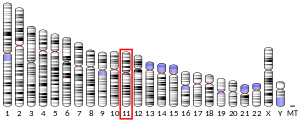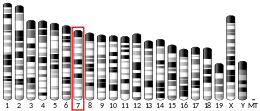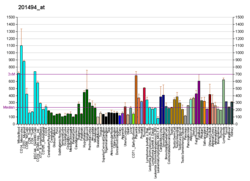PRCP
Lysosomal Pro-X carboxypeptidase is an enzyme that in humans is encoded by the PRCP gene.[5][6]
The protein encoded by this gene is a lysosomal prolylcarboxypeptidase, which cleaves C-terminal amino acids linked to proline in peptides such as angiotension II, III and des-Arg9-bradykinin. The cleavage occurs at acidic pH, but the enzyme activity is retained with some substrates at neutral pH. This enzyme has been shown to be an activator of the cell matrix-associated prekallikrein. The importance of angiotension II, one of the substrates of this enzyme, in regulating blood pressure and electrolyte balance suggests that this gene may be related to essential hypertension. Alternatively spliced transcript variants encoding distinct isoforms have been observed.[6]
References
- 1 2 3 GRCh38: Ensembl release 89: ENSG00000137509 - Ensembl, May 2017
- 1 2 3 GRCm38: Ensembl release 89: ENSMUSG00000061119 - Ensembl, May 2017
- ↑ "Human PubMed Reference:".
- ↑ "Mouse PubMed Reference:".
- ↑ Tan F, Morris PW, Skidgel RA, Erdos EG (Sep 1993). "Sequencing and cloning of human prolylcarboxypeptidase (angiotensinase C). Similarity to both serine carboxypeptidase and prolylendopeptidase families". J Biol Chem. 268 (22): 16631–8. PMID 8344943.
- 1 2 "Entrez Gene: PRCP prolylcarboxypeptidase (angiotensinase C)".
Further reading
- Odya CE, Marinkovic DV, Hammon KJ, et al. (1978). "Purification and properties of prolylcarboxypeptidase (angiotensinase C) from human kidney". J. Biol. Chem. 253 (17): 5927–31. PMID 28321.
- Yang HY, Erdös EG, Chiang TS (1968). "New enzymatic route for the inactivation of angiotensin". Nature. 218 (5148): 1224–6. doi:10.1038/2181224a0. PMID 4297812.
- Jackman HL, Tan F, Schraufnagel D, et al. (1995). "Plasma membrane-bound and lysosomal peptidases in human alveolar macrophages". Am. J. Respir. Cell Mol. Biol. 13 (2): 196–204. doi:10.1165/ajrcmb.13.2.7626287. PMID 7626287.
- Watson B, Nowak NJ, Myracle AD, et al. (1997). "The human angiotensinase C gene (HUMPCP) maps to 11q14 within 700 kb of D11S901: a candidate gene for essential hypertension". Genomics. 44 (3): 365–7. doi:10.1006/geno.1997.4883. PMID 9325062.
- Shariat-Madar Z, Mahdi F, Schmaier AH (2002). "Identification and characterization of prolylcarboxypeptidase as an endothelial cell prekallikrein activator". J. Biol. Chem. 277 (20): 17962–9. doi:10.1074/jbc.M106101200. PMID 11830581.
- Moreira CR, Schmaier AH, Mahdi F, et al. (2002). "Identification of prolylcarboxypeptidase as the cell matrix-associated prekallikrein activator". FEBS Lett. 523 (1–3): 167–70. doi:10.1016/S0014-5793(02)02980-0. PMID 12123826.
- Strausberg RL, Feingold EA, Grouse LH, et al. (2003). "Generation and initial analysis of more than 15,000 full-length human and mouse cDNA sequences". Proc. Natl. Acad. Sci. U.S.A. 99 (26): 16899–903. doi:10.1073/pnas.242603899. PMC 139241. PMID 12477932.
- Ota T, Suzuki Y, Nishikawa T, et al. (2004). "Complete sequencing and characterization of 21,243 full-length human cDNAs". Nat. Genet. 36 (1): 40–5. doi:10.1038/ng1285. PMID 14702039.
- Shariat-Madar Z, Mahdi F, Schmaier AH (2004). "Recombinant prolylcarboxypeptidase activates plasma prekallikrein". Blood. 103 (12): 4554–61. doi:10.1182/blood-2003-07-2510. PMID 14996700.
- Gerhard DS, Wagner L, Feingold EA, et al. (2004). "The Status, Quality, and Expansion of the NIH Full-Length cDNA Project: The Mammalian Gene Collection (MGC)". Genome Res. 14 (10B): 2121–7. doi:10.1101/gr.2596504. PMC 528928. PMID 15489334.
- Wang L, Feng Y, Zhang Y, et al. (2006). "Prolylcarboxypeptidase gene, chronic hypertension, and risk of preeclampsia". Am. J. Obstet. Gynecol. 195 (1): 162–71. doi:10.1016/j.ajog.2006.01.079. PMID 16681991.




